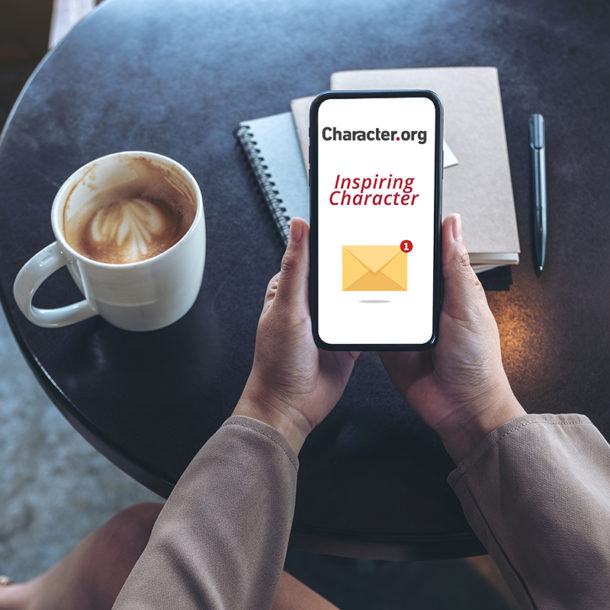Debra Matell Cohen, Ed.D.
John Winthrop Wright Director of Ethical Education
Character.org
It’s rare to hear a student, at any age, say that cheating in school is okay. And yet, according to the International Center for Academic Integrity’s most recent survey of students across multiple university campuses and U.S. high schools, cheating still occurs – at an alarming rate. Of the 70,000 high school students surveyed:
o 64% admitted to cheating on a test
o 58% admitted to plagiarism
o 95% participated in some form of cheating
Clearly, cheating is a widespread and pervasive issue and one that needs to be addressed by school administrators and educators and reinforced by parents and other caring adults. Perhaps not surprisingly, during the coronavirus pandemic, reports of cheating jumped as student learning moved online, with one university reporting a 79% increase from fall 2019 to spring 2021. Although increased use of online proctoring tools may be somewhat responsible for this alarming figure, it’s important to understand the scope of this problem so we can talk about how to address it.
What is academic integrity?
Academic institutions, whether K-12 schools or colleges and universities, create their own definitions of academic integrity. These definitions typically include demonstrating honesty and responsibility, as well as upholding an agreed-upon code of conduct that includes values such as fairness and trustworthiness.
Cheating can take several forms. Individual cheating includes using cheat sheets during assessments, copying work from another student without permission, or copying material without citing the source and submitting it as the student’s own. Collective cheating can include students working together on an assignment when the instructor clearly specified individual work, helping others cheat, or copying from another student with their permission. Contract cheating, the “newest” of the ways in which students are demonstrating academic dishonesty, refers to students completing their assignments with the help of a third party. According to academic firm Turnitin, this could include a friend or family member completing work on a student’s behalf or students purchasing completed assignments through “essay mills.”
Why do kids choose to cheat?
There are many reasons students choose to cheat. In my former middle school classroom, the most common type of cheating my students demonstrated was plagiarism, which I discovered was due to their lack of understanding what constitutes this form of stealing another’s work. According to Carnegie-Mellon University’s Eberly Center, students cheat for the following reasons:
– Confusion about what constitutes cheating
Students may not fully understand what is considered to be cheating, whether in terms of plagiarism or group versus individual assignments.
– A need or desire to help others
Some students feel obligated to help others in their work, whether because of peer pressure or other relationship issues (for example, helping a family member). When this help crosses a line, it can constitute cheating, including sharing test answers, completing others’ homework as a favor or for pay, and other types of collective or contract cheating.
– Poor study habits
Some students have not developed strong study habits, leading them to fall behind in class, creating a feeling that they need to cheat.
– High stakes assessments
Competition for grades is a significant reason students cheat, especially when students are feeling anxious about a particular test or assignment.
– “Everyone’s doing it”
Students may be influenced by peer pressure and feel it’s OK for them to cheat because they believe others are cheating and not getting caught.
– Desire for grades versus true learning
Students may not comprehend the true meaning of learning or mastery of a subject and may “only be in it for the grade.” If they don’t have the desire to learn a subject, understanding the course material becomes less important than the scores students receive on assignments and assessments.
– No relationship with the teacher or instructor
Students who feel they have no relationship with their teacher may be more likely to cheat.
– The belief they won’t get caught
Some students believe they can cheat and no one will find out, so they won’t experience any repercussions or penalties for their behavior.
In my next two articles I’ll discuss the growing issue of cheating in schools and how parents and educators can help their children and students understand why cheating, for so many reasons, is wrong. Of course, the number one reason students should not cheat is because they have decided that being honest is one of the core ethical values they want to live by. Our role as parents and educators is to help our children succeed with integrity, now and in the future.
Read the previous parts of this series, Why Do Kids Lie? and Why Do Kids Steal? and sign up to receive the “Ethics in Action” blog and webinar series in your Inbox. Be sure to subscribe to receive Parts 2-5 in the Why Do Kids Cheat? series:
Part 2: What Parents Can Do When Their Child is Cheating
Part 3: What Teachers Can Do When Their Students are Cheating
Part 4: What Workplace Leaders Can Do When Their Employees are Cheating
Part 5: Webinar: An Interview with an Expert on Why Students Cheat
To sign-up for our “Ethics in Action” blog and webinar series, click here.







One further reason for cheating that is a very distant cousin of why mass shootings happen in school is that students are keenly disappointed in their education. They feel the culture of school has let them down by demanding, judging and being irrelevant.
Glad to see Character.org tackle this challenging topic and your new resources to promote integrity.